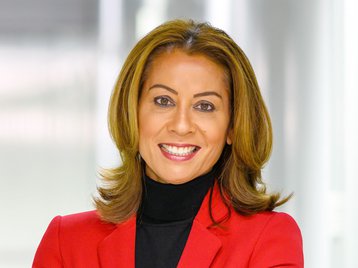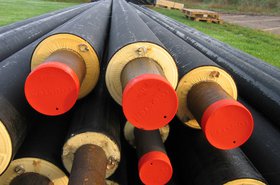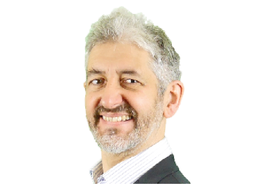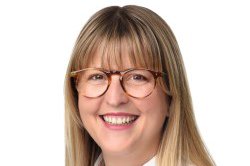In the world of data centers, the giant bit-barns run by global hyperscalers get most of the attention, but there’s a world of smaller colocation providers dealing with local needs.
And those smaller players live or die by the quality of their conversations, says Alexandra Schless, CEO of the Netherlands provider NorthC.
Speaking to DCD, she has a clear message. Data centers need a strong local perspective. They need to be part of the community around them. And they can only do that by talking to governments, customers, and other local players
It’s a viewpoint that she thinks she can spread to neighboring countries.
Dutch roots
NorthC began in 2019, when the DWS investment division of Deutsche Bank merged two Dutch providers it owned, NLDC and TDCG. It dubbed the new company NorthC in 2020 and appointed Schless as CEO.
A Dutch data center veteran, Schless spent 16 years at European colocation provider Telecity, running the Netherlands and then Western Europe. In 2016, Telecity was acquired by Equinix, and she stepped up there to become Equinix’s vice president of global accounts & networks for EMEA.
At NorthC, she has narrowed her horizon to become a provider in a single country - albeit as the biggest Dutch provider, with ten data centers to its name.
Or perhaps her arrival was a sign that NorthC intended to expand beyond the borders of the Netherlands.
As she tells DCD, the true story is somewhere between the two. Schless has a vision of how data centers should cater to local markets - and NorthC is starting to expand beyond its Dutch roots.
Birth of the industry
Schless began in the early days of the Internet industry and data centers. The pioneering UK firm Telecity started in 1998 with its first facility in Manchester; two years later Schless opened up the Netherlands for the company.
“I started at TeleCity Group in the Netherlands in 2000, and that was really the early days of the data center industry. At that time, we had a few companies starting off these data centers.”
Telecity grew rapidly, building and acquiring facilities: “We grew the company, over 15 years, to the leading position in Europe. And then when we sold it to Equinix,” she said.
That deal was actually fought over. Telecity was initially sold to its European rival Interxion for $2.2 billion, but then global player Equinix stepped in, and the price went up to $3.5 billion.
“I stayed at Equinix for three years,” says Schless. Equinix promoted her to vice president of the whole EMEA region, but her views on the data center sector eventually took her out of the global player, to a more regional one.
“I came in contact with our current shareholders, DWS,” she says, “and they told me about their view on the development of the data center industry.”
Despite - or perhaps because of - her time at Equinix, Schless believes global players can’t do it all: “You will always have the international providers serving an international global market, where customers need global coverage,” she says.
That was the vision behind NorthC - and to be frank, the group needed a vision, to avoid the inevitable process of consolidation and eventual acquisition by a global player like Equinix, or rival Digital Realty.
TDCG was a local group with four facilities, while NLDC was a spin-off from the Dutch telco KPN, a victim of the mismatch between the ambitions of telecoms companies, and their abilities in the data center sector.
Telcos leave the sector
Like almost every other telco in the late 2010s, KPN got out of data centers. First it rebranded its six facilities with the bland name NLDC (Netherlands Data Centres), and then sold them to DWS, clearing the way for its own consolidatory $50 million acquisition by US telco GTT.
When DWS merged the two companies, it could have been simply another step in the consolidation of data center providers, but Schless says not: “We started NorthC by buying the data centers of KPN and the TDC group, and formed NorthC based on the vision that organizations value having a data center partner they can phone.”
Customers need local attention because of hybrid IT, she says: “Businesses, public and semi-public organizations do a hybrid solution, using the public cloud or private cloud and still have part of their IT environments on-premises, which may be managed by an IT partner or themselves.”
That makes things more complex: “More and more data is being generated by businesses, and their competitive position is driven by the data. They have the data analysis, and at the same time have to optimize their business processes. Data volumes will increase over time with more data to be analyzed and processed.”
With that complexity, not all customers trust a remote large operator: “We spoke to existing customers, and also new customers and prospects, and we saw that a lot of these customers really value the fact that their data center partner is in the region where they have their headquarters or their main production sites.”
In her view, data center customers are still hands-on, and they want their partners to be the same.
“They still have their own people coming to the sites, and they use a regional local partner that can also come to the site,” she says. “It was really interesting to see that, apart from having the data close to where it is generated and where it needs to be processed, they also valued the fact that the data center was close to where they're located. And I strongly believe in that.”
Continuity
“If you look at what we, as a data center, provide for our customers, the basic service is power and data halls to put your IT equipment in,” she says.
That need goes back to the early days, when colocation data centers provided a more reliable home for enterprise IT: “In the old days, the customer had their IT environment in their own office or in the basement. And then they thought, I want to have continuity and have it up and running 24/7. So I'll lift and shift the servers and the routers, and put them in a data center, because I don't have a generator in my own basement.”
Continuity is still a major reason to choose a data center, she says: “That is still part of the service, but today, the customers are looking for a data center partner that can be part of the total solution.
“If you look at the hybrid cloud strategy, you need to be able to have data transferred between public cloud, private cloud and maybe keep some of it on-prem,” she says “So, nowadays, the customers are looking for a solution that provides them the possibility to connect to several clouds. They need to have the connectivity to be connected to their own offices.”
That means they need IT partners, “that can help them with creating and maintaining certain business applications.”
Customers looking for a data center partner today, are looking for one which is part of an “ecosystem,” she says, “that can really help you with this digital transformation.”
Keep it local
This places demands on the skills of the data center operators within the company, but it’s also fulfilling for the staff to be in an environment where their skills are important - and that’s a different picture from a telco, where data centers were an afterthought.
“The companies we bought, the data centers of KPN and the data centers of TCG, had a different positioning,” she explains. “The data centers of KPN were part of a very big telecommunications company, and data center services were just one of the things that they offered to their end customers.
“At NorthC, we have a different focus,” she says. “We are in essence a data center company - and, the conversations we have with our customers are all around the solutions that we can provide from the data center.”
For the staff at TDCG, they can now be “proper data center people,” and this has been a welcome change: “During the integration of the two companies, we really took the people on board, to help them make that change from a big telecommunications company to a focused specialized data center company, where you have different conversations with end customers. And I would say that we have succeeded in that.”
NorthC has kept the experienced staff of its constituent companies, she says: “In an integration period it is normal that some colleagues will leave. But we have that momentum and a lot of colleagues are into the growth. We have a lot of colleagues from the existing organizations, but we also got a lot of new colleagues.”
A regional player - entering Germany
But companies can’t stand still. NorthC is now a major Netherlands provider, but if it is not heading for acquisition, what are its next steps?
“We're really a standalone regional data center player,” she says, with a good proposition for Netherlands-based customers, and plans to expand by replicating the same local services model in neighboring countries.
To avoid confusion, she clarifies. Wholesale colocation giants use the word “regional” to continent-sized areas such as LATAM, APAC, or EMEA. But for Schless, “regional” refers to an area the size of one country, or smaller.
“I think the whole regional play we see in the Netherlands, I'm absolutely convinced that it applies also to other countries in Europe,” she says. So far, that ambition expands to the so-called “DACH” area, consisting of the German-speaking countries of Germany, Austria, and Switzerland.
“And if you look, at Germany, that’s a country that is really regionalized,” she says, referring to the German structure of states or “lande,” which often have different laws. “For me, it was quite evident that next to the Netherlands, Germany would be a country and a market where this regional play would be successful.
“In Germany, we bought the data centers of q.beyond, a managed services company,” she says.
Formed as a consultancy, q.beyond bought into the data center sector around 2010, acquiring IP Partner and IP Exchange, a colocation player that had roots back to around the year 2000.
Like NLDC, q.beyond was not exploiting and developing its data center facilities as centers for business, says Schless: “We saw exactly the same thing - the data centers were part of a bigger company that also provided other services.”
As part of NorthC, IP Exchange staff now have a more specific job. “They say - now we can really focus on the data centers, we're going to invest again in data centers, and we're going to really be part of a company that wants to grow in the data center industry.”
To develop NorthC in the Germanic countries, Schless has appointed Frank Zachmann, a 25-year data center veteran, with multiple stints at Equinix, Interxion, and other data center players, as managing director.
NorthC’s press release on Zachman’s appointment hints at wider goals: “In the long term, NorthC wants to continue this growth right across Europe, creating a platform of interconnected regional data centers for regional expertise and locations on a national level.”
“[In Germany] it is even more important to understand properly the regional characteristics and the regional culture, and to have a relationship with a regional IT partner,” says Schless, emphasizing that IP Exchange is strong in the major cities of the Bavaria (Bayern) region.
“Now we're present in Nuremberg and Munich. And you know, companies in Bayern really like to do business with other companies from that region. We have a lot of customers in Nuremberg and Munich. We also do have customers from other regions, but the majority comes from there.”
Moving into Switzerland
Continuing its DACH expansion, NorthC next bought three data centers belonging to Netrics in Switzerland, where Schless sees a similar micro-state regionalization.
“Switzerland has different cantons, or ‘provinces.’ Although Switzerland is a much smaller country, the different cantons have their own way of interacting and dealing with regional companies.”
Within those cantons, Swiss public and private companies are going through the same digital transformation processes, and adopting hybrid cloud solutions, so Schless believes the country is ripe for the NorthC approach.
Since she mentioned DACH, we ask if the remaining DACH country Austria is the next target. For now, she says, NorthC will be building up in its existing locations.
“We’re quite busy with the first integration phase in Switzerland and Germany,” she says. “We would like to further expand in the countries because ultimately, we want to have a nationwide platform of regional data centers, meaning we're looking at other regions in Germany and Switzerland.”
Beyond that, she says “we don’t have targets, but we look at the countries where we think, is it a logical add-on to our platform of regional data centers? And is it an interesting opportunity?”
NorthC has “the appetite and the ambition,” she says, and “if there are interesting opportunities for us in Northern Europe, we will seriously look at them.”
The company’s approach of developing local facilities squares well with governments’ desire to establish data centers outside the overcrowded hubs. “In the Netherlands, the national government is looking at different areas where they can where they can establish data center clusters.” NorthC’s facilities in Eindhoven and Groningen meet that demand.
But she’s definite that NorthC has no interest in making big wholesale data centers: “We're in the enterprise and public sector. Hyperscale is a big market but it already has a number of very good suppliers. And it's a different play. In my opinion, there are already enough suppliers going after the segment.”
“I think what we're good at, and what we really like to do, is that close interaction with different enterprises. The DNA of NorthC is being local, open, flexible, and entrepreneurial. We like creating these regional relationships and ecosystems, That is what our mission is.”
Local governments
Do data centers need more local advocacy in NorthC’s home turf, the Netherlands and Germany? After all, Amsterdam and Frankfurt are two cities where the sector’s demands for land and power have faced strong local criticism, and the authorities have responded with restrictions affecting new facilities.
“In every country, we need to make sure that we build the relationship with the local governmental bodies,” she says. “It’s very important when you can explain to local governments that we need data centers, because of our whole digital economy.”
Local governments can be critical towards data centers, she agrees, but says her approach is to “start the conversation early enough with them, about how we take sustainability on our agenda, and what we can do to give something back to the region.”
With that approach, she says, “it has been actually a good cooperation.”
NorthC’s smaller data centers use around four or five MW, and that compares well against the unpopular hyperscale facilities: “Up until now, we tend to get good cooperation with the local governments, but it is up to us to inform them and be open to them as soon as possible.”
Pitched the right way, she says “data centers can actually be part of the energy transition agenda.” She says that colocation data centers can consolidate enterprise IT, eliminating smaller inefficient IT rooms.
She’s ready to offer data center waste heat as an incentive: “Heating up schools, swimming pools, and houses, is a very interesting topic for a local government to further discuss, because that helps them on their sustainable agenda.”
All too often, waste heat reuse falls by the wayside as the data center doesn’t have a heat customer nearby but Schless says, it can be done with enough discussion. “When you have the plans, you have to get into the conversation as early as possible.
“You have to take the government by the hand and say this is possible, we can do this,” she says. “We built a new data center in Rotterdam last year. When we spoke to the local government, we came in contact with another party that wants to maintain and build that whole [heat] infrastructure.
"You need local government, and you need a commercial party who's going to really manage and build the infrastructure.”
The project is running as of early 2023, she says: “We will heat up 11,000 houses in the beginning, and that will grow, the more the data center is filled up. A lot of people talk about this, but you need three parties at the table or even more to get it done.”
Energy prices
Like other providers, NorthC has had to deal with high energy costs during the Ukraine war. “The energy price is something that I have never experienced in my 20 years of data centers,” she says.
“We buy energy on the future market, two, three, or four years ahead, and that has turned out well, for us - although the prices are higher than I'm used to five, six, or seven years ago.”
She also benefits from intelligent customers: “In the data center industry, customers pay for the energy they use. We have a pass-on model of energy. And with what's happened this year, all the customers understand what's happening on the energy market, and understand that energy has become more expensive.”
She’s looking to avoid future trouble, though: “We're thinking about buying energy in a different way. There's the opportunity, as a large user of energy, to buy solar power or wind power directly from a solar park, or wind park, and not get everything from the grid. That is something we're looking into as well, which gives a longer-term, more predictable view of what your power prices would be.
Prices are going up for these power purchase agreements (PPAs), because of heavy buying by the hyperscalers like Google and AWS, but she thinks, there is enough renewable energy to go around.
“There are a lot of initiatives in the Netherlands, as well as in Germany, for smaller solar parks,” she says. “We don't need the size of the parks that the Amazons, Googles, and Microsofts are buying from. We are currently actually already in discussion with different companies that want to build a solar park where we can have dedicated power.
“You will always need some form of energy via the grid, but it's a smaller part of what you're buying, so so you're a little bit less sensitive.”
Eindhoven and hydrogen
NorthC certainly played the sustainability card when it opened a data center in Groningen which has hydrogen as a backup option, and brought out hydrogen once again for another new facility in Eindhoven.
But as far as hydrogen is concerned, not all data centers are equal.
“In Groningen, the province is building an infrastructure for hydrogen,” says Schless. so the Groningen facility has hydrogen fuel cells for its backup power. “Ultimately we can connect to this infrastructure directly, and always have the availability of hydrogen for backup.”
In Eindhoven, there is no immediate prospect of a hydrogen infrastructure, but NorthC needed a data center there right away.
"Eindhoven is one of the fastest-growing high-tech regions in the Netherlands," she tells us. "It is well known for its university, but also a lot of startups and technology companies in the area. So for us, it was basically almost a no-brainer that, when our current data center is almost at a maximum capacity, we wanted to build a second data center there.”
With no immediate prospect of hydrogen on tap in Eindhoven, NorthC adopted technology that can work with both natural gas and hydrogen.
“In Eindhoven, we have so-called hybrid generators, that can run both on gas and hydrogen,” she says. “We are waiting for regions like Eindhoven region to start, and when they're ready, we can use the hydrogen.”
Government arguments
Sometimes, the authorities fall out with data center operators, as happened in Amsterdam’s “sleeping server wars.” The government instructed colocation providers that all idle servers should be put into a low-power “eco” standby mode. But the colos responded that they could not touch servers belonging to their customers.
“That is now in process. Data centers sending letters and emails to their customers, to ask if they can get [their servers] on eco mode,” she tells us.
“There is probably still a discussion with the local municipality to see where the end responsibility is. But this is an example where as an industry, it's so important to remain in discussion with the local municipality, to come to an agreement, which all parties can agree upon.”
She’s got another discussion to have in Frankfurt, a new Energy Efficiency Act makes strong demands on PUE and heat reuse, and has been described by the local data center group as a “data center prevention act.”
She says the industry is “investing a lot in becoming more sustainable, and I think that sometimes is a little bit off-radar.”
From a pan-European level, the data center sector faces stronger regulations and mandatory reporting of energy use, water use, and more. Schless says: “I think that is something that is is accepted by the industry saying, it's already in place, and it only means that we need to have more people dedicated to making sure that we do the right reporting.”
When European rules come down, they are implemented by local and national governments, and Schless says that’s where the conversations need to happen.
“The real discussion lands with the national government. When the rules are implemented by, national and regional governments, we can say, ‘Yes, we can do that.’ And if not, how can we have good conversations with them to see what's possible?”
Above all, she wants to take a conciliatory approach: “Our industry needs to stay in conversation with local, and national governmental bodies, to educate them, but also to think about solutions together. Because ultimately, I think we all have the same task. We all need to go through this energy transition, rather do it together than against each other.”







